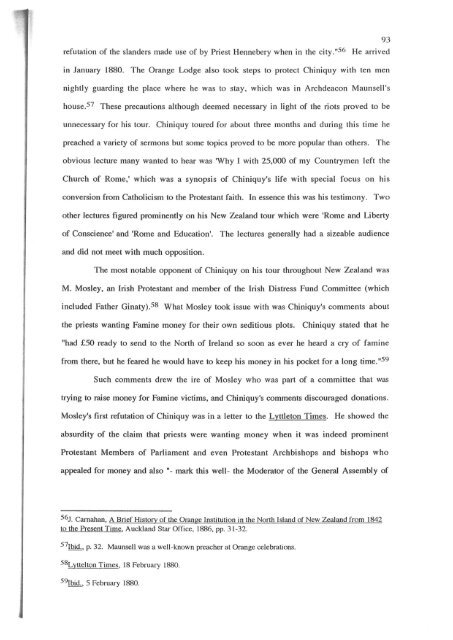TRANSPLANTED IRISH INSTITUTIONS - University of Canterbury
TRANSPLANTED IRISH INSTITUTIONS - University of Canterbury
TRANSPLANTED IRISH INSTITUTIONS - University of Canterbury
You also want an ePaper? Increase the reach of your titles
YUMPU automatically turns print PDFs into web optimized ePapers that Google loves.
93<br />
refutation <strong>of</strong> the slanders made use <strong>of</strong> by Priest Hennebery when in the city."56 He arrived<br />
in January 1880. The Orange Lodge also took steps to protect Chiniquy with ten men<br />
nightly guarding the place where he was to stay, which was in Archdeacon Maunsell's<br />
house. 57 These precautions although deemed necessary in light <strong>of</strong> the riots proved to be<br />
unnecessary for his tour. Chiniquy toured for about three months and during this time he<br />
preached a variety <strong>of</strong> sermons but some topics proved to be more popular than others. The<br />
obvious lecture many wanted to hear was 'Why I with 25,000 <strong>of</strong> my Countrymen left the<br />
Church <strong>of</strong> Rome,' which was a synopsis <strong>of</strong> Chinrquy's life with special focus on his<br />
conversion from Catholicism to the Protestant faith. In essence this was his testimony. Two<br />
other lectures figured prominently on his New Zealand tour which were 'Rome and Liberty<br />
<strong>of</strong> Conscience' and 'Rome and Education'. The lectures generally had a sizeable audience<br />
and did not meet with much opposition.<br />
The most notable opponent <strong>of</strong> Chiniquy on his tour throughout New Zealand was<br />
M. Mosley, an Irish Protestant and member <strong>of</strong> the Irish Distress Fund Committee (which<br />
included Father Ginaty).58 What Mosley took issue with was Chiniquy's comments about<br />
the priests wanting Famine money for their own seditious plots. Chiniquy stated that he<br />
"had £50 ready to send to the North <strong>of</strong> Ireland so soon as ever he heard a cry <strong>of</strong> famine<br />
from there, but he feared he would have to keep his money in his pocket for a long time. "59<br />
Such comments drew the ire <strong>of</strong> Mosley who was part <strong>of</strong> a committee that was<br />
trying to raise money for Famine victims, and Chiniquy's comments discouraged donations.<br />
Mosley's first refutation <strong>of</strong> Chiniquy was in a letter to the Lyttleton Times. He showed the<br />
absurdity <strong>of</strong> the claim that priests were wanting money when it was indeed prominent<br />
Protestant Members <strong>of</strong> Parliament and even Protestant Archbishops and bishops who<br />
appealed for money and also "- mark this well- the Moderator <strong>of</strong> the General Assembly <strong>of</strong><br />
56J. Carnahan, A Brief History <strong>of</strong> the Orange Institution in the North Island <strong>of</strong> New Zealand from 1842<br />
to the Present Time, Auckland Star Office, 1886, pp. 31-32.<br />
57Ibid., p. 32. Maunsell was a well -known preacher at Orange celebrations.<br />
58Lylte1ton Times, 18 February 1880.<br />
59jbid., 5 February 1880.
















